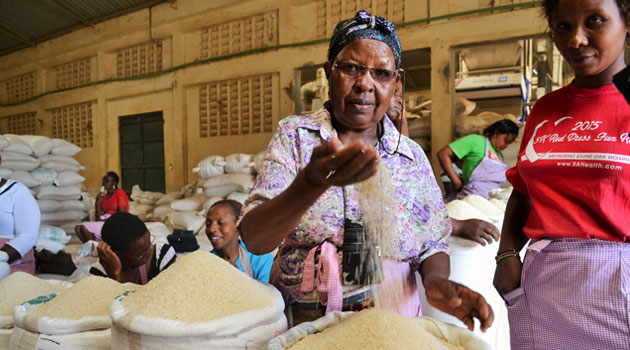
With diversification of the food products being grown in the country, shortage of flour may not have a huge impact on Kenyans like is the case for Kirinyaga County/MOSES MUOKI
NAIROBI, Kenya, Jun 28 – The Biblical land of Canaan promised to children of the Israelites had everything – milk, honey and spacious land.
Crisscrossing Kirinyaga County, one may be forgiven to think it is the Promised Land since despite the ongoing drought, the county is covered with hectares of agricultural produce from maize to rice farms, coffee to tea farms, tomato to banana farms and to cap it all, it is at the foot of the scenic Mount Kenya.
A section of the county is mountainous while in other parts it is flat, but notably, where two valleys meet, a stream or river runs through.
For the past few months, Kenyans have engaged in debate over whether we are food secure, following the crippling shortage of flour coupled with a high price of basic commodities.
What are some of the lessons the country can pick from the populous Kirinyaga County on farming?
With diversification of the food products being grown in the country, shortage of flour may not have a huge impact on Kenyans like is the case for Kirinyaga County.
– Modern Farming –
It is in Mwea, the stronghold of rice production in the county, where the Capital FM News crew learnt about the modern way of rice farming, one that has increased productivity.
About 50 per cent of rice in the country is produced in the constituency.
Moses Kariithi a farmer at the Mwea Irrigation Scheme understands well about the Market Oriented Agriculture Promotion Project (MAPP), which has contributed to the high production of rice by farmers, while using less water.
The project was initiated by the government but financed by the Japan International Cooperation Agency (JICA) and has converted acres of land that had been neglected to fruition.
Kariithi says the project has also reduced the cost of production from Sh60,000 to Sh40,000 per acre.
“JICA facilitated the construction of the canal but the farmers have developed their fields. Before, it just used to be bare land,” he said in reference to some 20 acres of land, which have already started yielding produce.
“Farmers have improved their standard of living through this project.”
The project, he says, is purely designed for irrigation purposes since some parts are dry.
“The project has a bigger impact on productivity because there before nothing used to grow here,” he said. “It has engaged so many people in employment.”
Under the project, farmers get 40 bags of rice per acre.
His appeal is that the project is extended to all parts of the country where rice is grown.
– About the Project –
The MAPP technology entails planting in such a way that it will be easy to weed around the crop, according to Kariithi.
Through the project, farmers are also aided on the best fertilizer to use after thorough soil analysis.
“Before, farmers thought you needed continuous water flooding which is not the case now…you don’t need continuous water flooding especially in the vegetative stage of the crop. You just need wet and dry condition,” he said.
His request to the government is to introduce other variety of rice in the area.
To increase the acreage of productive land, he says the government should also reclaim wetlands, which should act as water reservoirs.
James Kinyua a rice farmer in the area also expresses similar sentiments but urges the government to expedite the construction of Thiba Dam, which he says will eliminate all their water challenges.
“We just need enough water and nothing else,” he said.
– Rice Tycoon –
Charles Njiru alias Mkombozi is a man who prides himself as one who plants hope where there is desperation.
Njiru – the owner of the multi-million shillings Nice Rice Miller – says it is time Kenyans adopt other types of food other than relying on maize flour.
This, he says cannot be possible if rice farming is neglected despite the massive potential in the country.
He also urges the government to control the importation of rice to the country to avoid a surplus in the market.
“This will impact negatively on the income of the Mwea people,” he said. “We have the potential of even exporting rice in the country but more needs to be done.”
The Sh20 billion Thiba dam project has been stalled by wrangles revolving compensation of landowners.








































